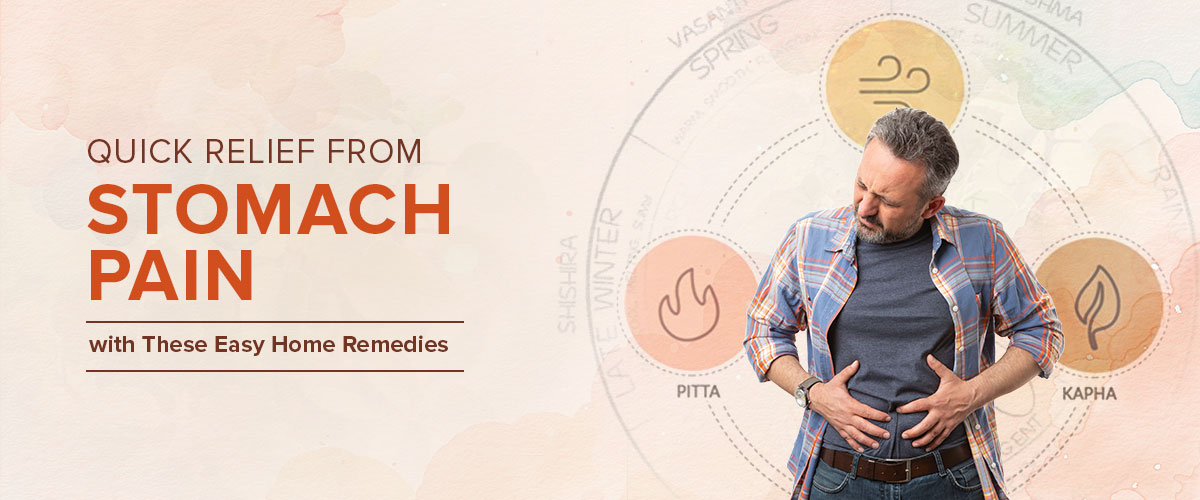Home Remedies for Stomach Pain

Millions of people suffer from stomach pain worldwide. It can interfere with everyday activities and make even simple tasks uncomfortable or unbearable. Whether it's a mild ache or a major discomfort, it can impact quality of life. These pains are usually signs of minor issues like gas or indigestion but could also signal more serious health issues.
Using home remedies for stomach pain management is a gentle, simple and affordable choice. Such all-natural solutions - usually passed down through generations - could offer immediate relief with no prescription medicines. Using ingredients which are readily prepared in the kitchen, they're convenient and safe and therefore are perfect for all those searching for natural ways to ease a sore throat at home.
What is Stomach Pain?
Stomach pain (also called abdominal discomfort, medically) is a discomfort or ache that happens between the chest and pelvis. It might be a mild, intermittent ache or sometimes a sharp, acute pain which signals a more serious health issue. Typical symptoms of stomach pain include a sharp, stabbing feeling, a dull ache or a sensation of pressure.
This is a troubling condition as it impacts your physical health and your daily activities. Stomach pain may be from indigestion, food poisoning, gastritis, gas, or more serious conditions including inflammatory bowel diseases or ulcers. Understanding the symptoms of stomach pain can help figure out how intense it is and whether home remedies are enough or medical consultation is necessary.
What Causes Stomach Pain?
The causes of stomach pain are diverse, due to the variety of influences which can impact it. From diet options to infections, knowing these factors might help understand why you might be experiencing discomfort.
Digestive Problems: They're among the most common causes of stomach pain:
- Indigestion: Overeating, eating too rapidly, or consuming difficult to digest foods may trigger this syndrome.
- Gas & Bloating: Results from swallowing air while eating or drinking and consuming certain foods like beans and carbonated drinks.
- Constipation: Frequently because of inadequate fibre intake, poor fluid intake, and lack of exercise.
Infections: Viral, parasitic or bacterial infections could result in :
- Gastroenteritis (Stomach Flu): Causes inflammation of the stomach and leads to discomfort, nausea, and diarrhoea.
- Food Poisoning: Eating contaminated foods causes cramping, nausea and vomiting.
Inflammatory Conditions: Chronic conditions which result in continual discomfort :
- Irritable Bowel Syndrome: Characterised by bloating, gas, constipation and diarrhoea.
- Inflammatory Bowel Disease: Includes Crohn's disease and ulcerative colitis, diseases which inflame the gastrointestinal tract for long.
- Gastritis: Inflammation of the stomach wall, typically from too much alcohol consumption, chronic stress or some drugs (NSAIDs).
Ulcers & Acid Related Disorders: Some disorders affecting this condition include:
- Peptic Ulcers: Sores develop on the lining of the stomach, small intestine, or esophagus due to a surplus of stomach acid or bacterial infections.
Acid Reflux (GERD): Happens when stomach acid flows back to the esophagus and causes discomfort and irritation.
Food Allergies & Intolerances: Adverse reactions to some foods which cause stomach pain:
- Lactose Intolerance: Difficulty digesting lactose in milk products.
Gluten Sensitivity: Causes pain, diarrhoea and bloating with gluten-containing cereals like wheat.
Home Remedies and Tips
Home remedies for stomach pain are an effective option for mild to moderate stomach pain. But in case your symptoms persist and worsen, it is important to consult an Ayurvedic doctor to rule out severe illnesses.
Ginger Tea: Ginger tea has anti-inflammatory properties which help to soothe stomach pains. To make: grate one piece of fresh ginger and steep in boiling water for 5-10 minutes. Strain and add a teaspoon of honey to the tea. Ginger tea can reduce inflammation, nausea and settle your stomach.
Peppermint Tea: The herb peppermint is great for digestion. It has menthol, which calms the stomach muscles and makes it easier to digest. To make peppermint tea: Steep fresh or dried peppermint leaves in boiling water for around ten minutes, then strain and consume it. This tea is particularly useful for constipation and gas symptoms.
Chamomile Tea: Chamomile calms the mind & stomach. To make this: Boil soaked chamomile flowers in water for five minutes. Then, strain & drink the tea. Chamomile tea eases cramping and inflammation in the gastrointestinal tract and it is a gentle therapy for stomach pain.
Apple Cider Vinegar: Apple cider vinegar balances acid levels in the stomach. Mix 1 tablespoon of ACV in a glass of water and drink before meals. This cure can assist with indigestion & acid reflux and alleviate stomach pain.
Fennel Seeds: Fennel seeds are a conventional treatment for gas and bloating. Have a teaspoon of fennel seeds following meals or boil it in water to create a soothing tea. The antispasmodic qualities of fennel relax the muscles of the stomach, reducing gas and cramps.
Yoghurt: Yoghurt with live cultures is good for your digestion. It introduces many good bacteria into your intestine which assist with digestion. Eating a small bowl of plain yoghurt each day might support a healthy balance of gut flora.
Baking Soda: A typical household treatment for acid reflux is baking soda. Dissolve one teaspoon baking soda in a glass of water and drink it slowly. The baking soda neutralises stomach acid and eases indigestion and heartburn.
Aloe Vera Juice: Aloe vera has anti-inflammatory properties which can soothe an irritated stomach lining. A small cup of aloe vera juice on an empty stomach can soothe your stomach and lower discomfort.
Bananas: Bananas are an easy food to break down which neutralises stomach acid and reduces discomfort. They're especially helpful during diarrhoea to restore electrolytes and potassium levels.
Warm Compress: Warm compresses on your stomach can ease muscle spasms and cramps. Apply a hot water bottle or heating pad to the abdomen for around 15-20 minutes. This method promotes more blood flow to the skin surface & muscle tissues, helping to relax the muscles and reduce pain.
Lifestyle and Diet Recommendations
With home remedies, making lifestyle changes can help prevent & relieve stomach pain. Modifying your diet and lifestyle could help relieve symptoms and boost your digestive health.
Diet for Stomach Pain:
Take Fibre-Rich Foods: A high fibre diet could avoid constipation, a common symptom of stomach pain. Foods like whole grains, vegetables and fruits must be a staple in your food.
Stay away from Trigger Foods: For many people, spicy, oily and refined foods result in stomach discomfort. Determine the food items which trigger your symptoms and cut them down.
Keep Hydrated: Drinking enough water throughout the day helps with digestion & prevents constipation. Aim for eight glasses of water each day.
Consume Smaller, More Frequently Meals: Big meals may cause acid reflux and stomach discomfort. Smaller, more frequent meals could help control these symptoms.
Add Probiotics: Foods like yoghurt add good bacteria to your gut to assist with digestion and reduce inflammation.
Lifestyle Changes for Stomach Pain:
Regular Exercise: Moderate physical activity like walking or yoga might help with digestion and reduce stress, which might ease stomach pains.
Manage Stress: High stress may also harm your digestive health and fitness. Practices including meditation, deep breathing or regular exercise routines might help ease stress.
Stay away from Late Eating: Consuming close to bedtime could trigger indigestion and heartburn. Have your final meal a minimum of three hours prior to going to bed.
Limit Alcohol & Caffeine: Both alcohol & caffeine irritate the stomach lining and also induce acid production. Limit or eliminate these substances from your diet to ease stomach pain.



 Prev
Prev


































































































































